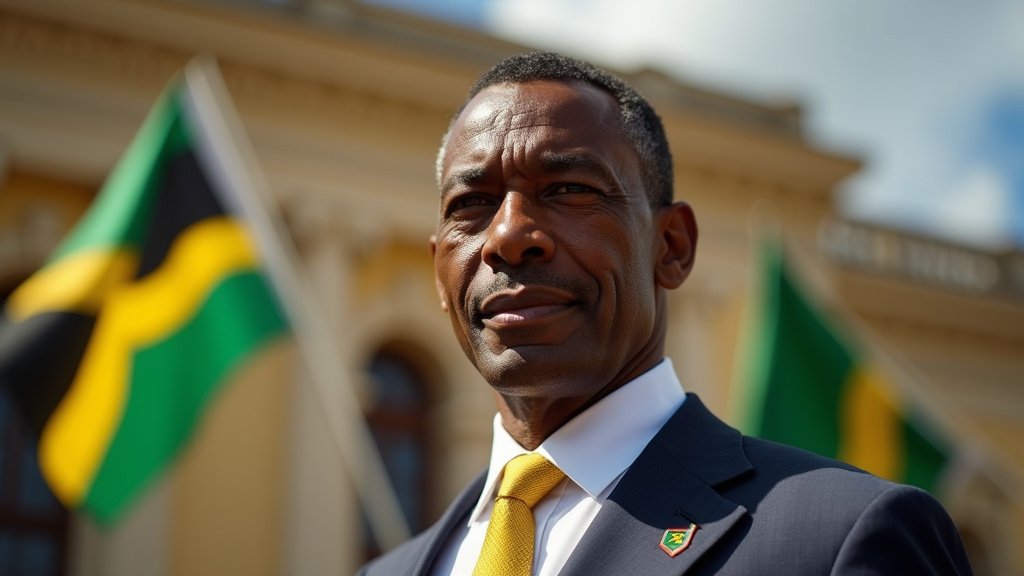Kingston, Jamaica – The Caribbean nation of Jamaica is poised for a significant electoral showdown, with Prime Minister Andrew Holness announcing that citizens will head to the polls on September 3. This pivotal election arrives just two days after Guyana’s September 1 vote, marking one of the final major electoral events in a remarkably busy political year for the 15-member Caribbean Community (CARICOM) bloc. The announcement sets the stage for a compelling contest, as the incumbent Jamaica Labour Party (JLP) seeks to extend its mandate against a resurgent opposition, creating a crucial moment for the nation and the wider regional community.
A Race for a Historic Third Term
Prime Minister Andrew Holness, aged 53, leads the charge for the Jamaica Labour Party, embarking on an ambitious quest for a third consecutive term in office. Should he succeed, Holness would etch his name into the annals of Jamaican political history, matching the formidable record set by elder statesman P. J Patterson. Patterson’s enduring tenure has long been a benchmark in the island’s political landscape, and Holness’s pursuit of this milestone underscores the high stakes of the upcoming vote. The formal gears of the election machinery will grind into motion on August 18, when parliamentary nominees are expected to present their official lists, solidifying the slate of candidates who will vie for legislative seats across the island. This phase will mark a critical point, transforming the political discourse from speculative campaigning to concrete electoral battles that will define the island’s future leadership.
The Opposition’s Renewed Hope
Facing Holness and the JLP is the main opposition People’s National Party (PNP), helmed by its leader, Mark Golding. The PNP enters this election cycle with a palpable sense of optimism, believing it possesses a strong chance for a significant turnaround. This renewed confidence is not unfounded; it is notably bolstered by the party’s recent successes in local government elections, which often serve as a bellwether for national sentiment. Furthermore, the opposition has capitalized on what it perceives as growing public dissatisfaction with the current administration. This discontent, according to the PNP, stems from a series of various corruption scandals that have plagued the government, casting a shadow over its reputation and eroding public trust within the Jamaican community. Golding’s strategy appears to hinge on converting this widespread disillusionment into votes, presenting the PNP as the credible alternative capable of ushering in a new era of governance for Jamaica.
Economic Progress Versus Public Discontent
Despite the headwinds generated by the opposition’s critiques and the lingering concerns over governance issues, Prime Minister Holness remains steadfastly confident in his administration’s prospects. He has vocally expressed his belief in securing a third term, consistently pointing to what he highlights as significant economic achievements. Holness asserts that his government has been instrumental in transforming Jamaica’s economic landscape, laying a strong and durable foundation for future growth and expanded opportunities for all citizens. His campaign narrative emphasizes fiscal discipline, infrastructural development, and policies designed to foster a robust economy. However, the true test will be whether the electorate prioritizes these economic gains over the issues of public trust and accountability raised by the opposition. The national debate is finely balanced between celebrating reported economic successes and addressing concerns over transparency and integrity within the highest echelons of government. The political news cycle will undoubtedly be dominated by these competing narratives in the weeks leading up to the vote.
A Regional Electoral Swirl in the Caribbean Community
Jamaica’s upcoming vote on September 3 does not occur in a vacuum; it is a significant event within a broader tapestry of political activity across the Caribbean. As one of the final electoral contests in a particularly active year for the 15-member CARICOM bloc, it underscores the vibrant democratic processes at play throughout the region. The proximity of Jamaica’s election to Guyana’s September 1 vote highlights the synchronized rhythm of democratic exercises unfolding within the Caribbean Community. This busy period of electoral engagement across the region signifies a crucial time for governance and leadership in a geo-politically vital part of the world. The outcomes in these nations, particularly Jamaica, will undoubtedly ripple throughout the community, influencing regional policies, trade relations, and overall stability. Observers from across the globe will be closely watching the unfolding news from Kingston, understanding its implications not just for the island itself, but for the wider Caribbean.
With the formal campaign period set to intensify following the August 18 nominee presentations, Jamaica stands at a crucial juncture. The nation faces a choice between continuity, championed by Prime Minister Holness and his record of economic transformation, and change, advocated by Mark Golding’s PNP, which seeks to capitalize on public weariness over alleged corruption. The news from the island will be closely scrutinized as the political community prepares for a high-stakes decision that will not only shape Jamaica’s future for the next term but also potentially influence the political discourse across the entire CARICOM region. As September 3 approaches, all eyes will be on Jamaica as its citizens head to the polls to cast their decisive votes.

